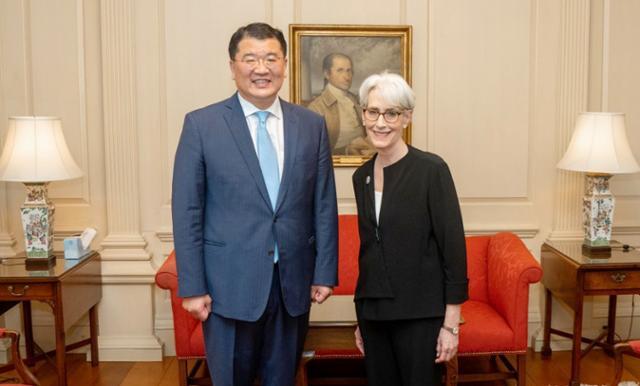 |
First Vice Foreign Minister Choi Jong-kun (L) and US Deputy Secretary of State Wendy Sherman pose for a photo in Washington on June 10, 2021, as they meet for talks in this photo provided by the foreign ministry. (Foreign Ministry) |
SEOUL/WASHINGTON -- US Deputy Secretary of State Wendy Sherman renewed calls Wednesday for North Korea to return to dialogue, stressing Washington's willingness to take "some patience" and holding out prospects of a "brighter future" for Pyongyang.
Sherman made the remarks following trilateral talks with her South Korean and Japanese counterparts, Choi Jong-kun and Takeo Mori, respectively, in Tokyo after North Korean Foreign Minister Ri Son-gwon rejected US' overtures for dialogue last month.
"The United States has made it clear that we are ready to engage with North Korea. They know that. We hope they'll respond positively," Sherman said during a joint press conference with Choi and Mori. "But as my colleagues have said, we must exercise some patience, perhaps not too much but some."
The deputy secretary then recalled the memory of her accompanying former Defense Secretary William Perry to Pyongyang in the 1990s to show the US' interest in dialogue with the North, noting the North responded with a proposal several months later.
"I hope it doesn't take that long this time, but we all have to understand that North Korea is also struggling with the pandemic, as is the entire world, has to live with the UN Security Council resolutions and the sanctions that come with it," Sherman said.
"But we do hope that they understand that a brighter future for their country comes from engaging in these discussions around denuclearization of the Korean Peninsula," she added.
Despite the US' offer to meet with the North "anywhere, anytime without preconditions," the North's top diplomat, Ri, said last month that his country was not considering "even the possibility of any contact" with the US That dampened optimism that emerged after leader Kim Jong-un signaled openness to dialogue.
Also at the press conference, Sherman underscored the "critical" importance of trilateral cooperation among South Korea, the US and Japan for the complete denuclearization of the Korean Peninsula.
"That close coordination sends a very critical message to North Korea, in that we are together and shoulder to shoulder in our approach to this policy," she said.
Sherman made clear that the trilateral session touched on China's assertiveness, as she mentioned issues of the East and South China seas and the Taiwan Strait at the heart of an intensifying Sino-US rivalry.
"When countries take actions that run counter to the US' interests, or that threaten our partners and allies', we will not let those challenges go unanswered. We will respond by standing shoulder to shoulder with our allies and partners," she added.
In a press release, State Department spokesman Ned Price said Sherman, Choi and Mori reaffirmed their countries' commitment to trilateral cooperation.
"During the meeting, the Deputy Secretary and the two vice foreign ministers committed to deepening trilateral cooperation to address the global challenges of the 21st century, including the climate crisis, pandemic response, and economic resilience and recovery," he said in a press release.
"They also discussed the shared commitment of the United States, Japan and the Republic of Korea to work toward the complete denuclearization of the Korean Peninsula and their intent to address the threat posed by the nuclear and ballistic missile programs of the Democratic People's Republic of Korea," he added, referring to the two Koreas by their official names.
Their gathering was expected to set the stage for Washington's engagement to foster reconciliation between Seoul and Tokyo, caught in a protracted row over Japan's wartime forced labor and sexual slavery, and its export curbs. Japan occupied Korea from 1910 to 1945.
To address these thorny issues, Seoul had sought to arrange a summit between President Moon Jae-in and Prime Minister Yoshihide Suga on the occasion of the upcoming Tokyo Olympics. That effort fell through, as they failed to narrow differences on the issues.
On the summit issue, Choi said that Seoul and Tokyo agreed to continue efforts to address pending issues based on progress made so far at the working level.
Seoul, Washington and Tokyo have held eight such rounds of three-way vice ministerial talks, including this week's session, since the inaugural gathering in April 2015. The previous session took place in Seoul in October 2017.
Choi and Sherman plan to hold strategic dialogue in Seoul on Friday to discuss bilateral relations, Korean Peninsula issues, and regional and global issues, Seoul officials said. (Yonhap)





![[Exclusive] Hyundai Mobis eyes closer ties with BYD](http://res.heraldm.com/phpwas/restmb_idxmake.php?idx=644&simg=/content/image/2024/11/25/20241125050044_0.jpg)
![[Herald Review] 'Gangnam B-Side' combines social realism with masterful suspense, performance](http://res.heraldm.com/phpwas/restmb_idxmake.php?idx=644&simg=/content/image/2024/11/25/20241125050072_0.jpg)

